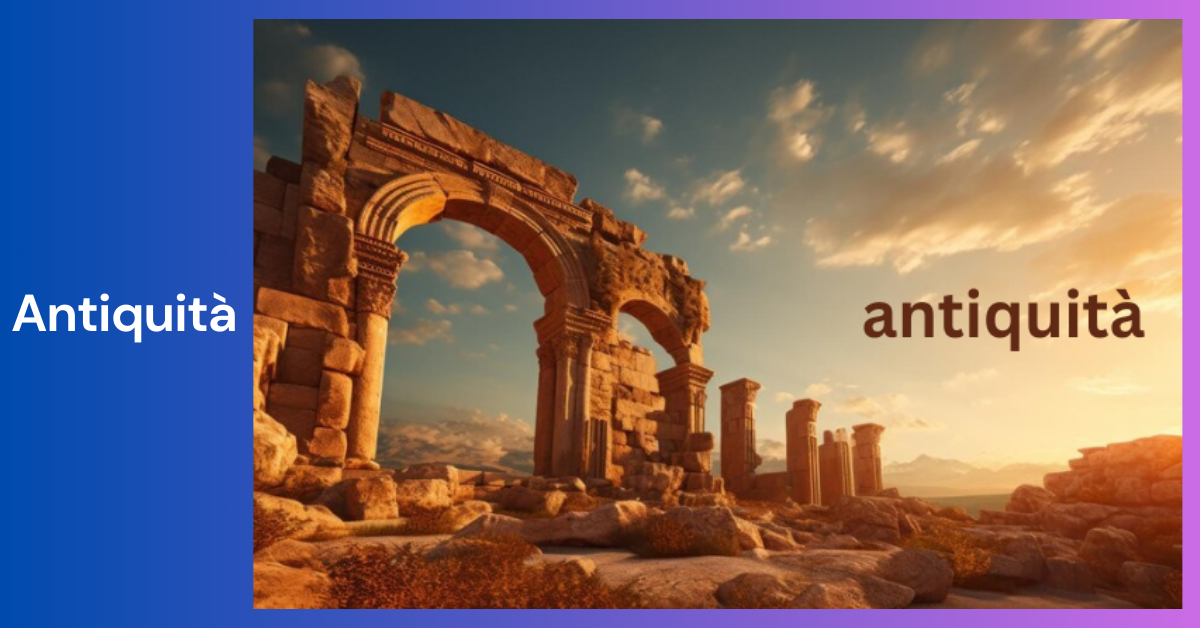
In the bustling realm of contemporary life, the allure of antiquità—an Italian term for antiquity—remains a captivating beacon of curiosity and reflection.
“Antiquità” explores ancient civilizations, revealing their achievements, challenges, and lasting legacies. It encapsulates the essence of societies like Egypt, Greece, and Rome, offering insights into their influence on modern culture and knowledge.
Antiquità serves as a portal to the past, allowing us to delve into the achievements, societal structures, and enduring legacies of ancient civilizations.
This article will take you on an enlightening journey through the wonders of antiquità, exploring its significance and the indelible marks it has left on our world.
Understanding Antiquità
Defining Antiquità
Antiquità refers to the period of human history that encompasses the earliest civilizations up to the Middle Ages.
It includes a diverse range of cultures such as Ancient Egypt, Greece, Rome, China, and Mesopotamia.
This era is characterized by remarkable achievements in various fields—architecture, art, philosophy, and governance—that have profoundly shaped human history.
The Value of Studying Antiquità
Studying antiquità is crucial for several reasons:
- Historical Insight: It provides a window into how ancient societies functioned, revealing the foundations of modern institutions and technologies.
- Cultural Appreciation: Understanding the artistic and philosophical contributions of ancient civilizations enhances our appreciation of cultural heritage.
- Legacy Recognition: Recognizing the achievements of ancient civilizations helps us value and preserve their contributions to modern life.
Major Civilizations of Antiquità
Ancient Egypt
Overview: Ancient Egypt is renowned for its extraordinary contributions to architecture, writing, and medicine.
This civilization thrived along the Nile River, which was central to its agricultural and economic prosperity.
Key Achievements:
- Hieroglyphics: Ancient Egyptians developed a complex system of writing that used pictorial symbols. This form of writing was crucial for record-keeping and ceremonial purposes.
- Pyramids: The Great Pyramids of Giza stand as iconic symbols of ancient Egyptian engineering prowess. These structures served as tombs for pharaohs and demonstrate advanced architectural techniques.
- Medicine: The ancient Egyptians made significant strides in medicine, including early surgical procedures and the use of herbal remedies. Their medical texts provide insights into their practices and beliefs.
Cultural Impact: Ancient Egyptian culture has had a lasting impact on art, literature, and religious practices.
The fascination with Egyptian mythology and symbolism continues to influence modern media and design.
Ancient Greece
Overview: Often hailed as the cradle of Western civilization, Ancient Greece made profound contributions to philosophy, democracy, and the arts.
The Greek city-states, particularly Athens and Sparta, were centers of cultural and intellectual development.
Key Achievements:
- Philosophy: Greek philosophers such as Socrates, Plato, and Aristotle laid the groundwork for Western thought. Their exploration of ethics, politics, and metaphysics continues to be influential.
- Democracy: Athens is credited with developing the concept of democracy, a system of governance where citizens participate in decision-making. This model has influenced modern democratic institutions.
- Theatre: Greek drama, including the works of playwrights like Sophocles, Euripides, and Aristophanes, introduced key elements of theatre such as tragedy and comedy. These dramatic forms have shaped Western literature and performance.
Cultural Impact: The legacy of Ancient Greece is evident in modern philosophy, political theory, and the arts.
The concept of democracy and the study of classical philosophy remain central to Western education and political thought.
Ancient Rome
Overview: Ancient Rome expanded upon Greek ideas and established a vast empire that influenced much of Europe and beyond.
Roman contributions to law, engineering, and language have had a lasting impact.
Key Achievements:
- Law: Roman law introduced foundational legal principles such as “innocent until proven guilty.” The Roman legal system has greatly influenced modern legal frameworks.
- Engineering: The Romans were master engineers, constructing roads, aqueducts, and monumental structures like the Colosseum. Their engineering feats facilitated the expansion and administration of the empire.
- Language: Latin, the language of Rome, is the precursor to the Romance languages (Spanish, French, Italian, Portuguese). It also remains influential in legal, scientific, and medical terminology.
Cultural Impact: Roman culture has left an enduring legacy in architecture, law, and language. The use of Latin in scholarly and legal contexts reflects the lasting influence of Roman civilization.
Ancient China
Overview: Ancient China is known for its long history of dynastic rule, technological innovations, and cultural achievements.
Chinese civilization has contributed significantly to science, technology, and philosophy.
Key Achievements:
- The Great Wall: The construction of the Great Wall of China was a monumental undertaking aimed at protecting against invasions. It reflects the organizational and engineering skills of ancient China.
- Paper and Printing: The invention of paper and movable type printing revolutionized communication and record-keeping. These technologies had a profound impact on the spread of knowledge.
- Philosophy: Confucianism and Daoism offered frameworks for ethical behavior and governance. Confucian principles continue to influence Chinese culture and philosophy.
Cultural Impact: Ancient Chinese innovations in technology, philosophy, and governance have shaped both Chinese society and global development. The philosophical and technological contributions of ancient China remain relevant today.
Ancient Mesopotamia
Overview: Often considered the “cradle of civilization,” Mesopotamia was home to some of the earliest urban centers and writing systems.
This region, situated between the Tigris and Euphrates rivers, saw the rise of early complex societies.
Key Achievements:
- Cuneiform Writing: The development of cuneiform writing in Mesopotamia was one of the earliest systems of writing. It enabled record-keeping, literature, and administrative tasks.
- Ziggurats: Ziggurats were massive, tiered structures that served religious and administrative functions. These architectural feats reflect the religious and social organization of Mesopotamian societies.
- Mathematics and Astronomy: Early developments in mathematics and astronomy in Mesopotamia laid the groundwork for future scientific advancements. Mesopotamian scholars made significant contributions to understanding celestial phenomena.
Cultural Impact: Mesopotamian innovations in writing, architecture, and science have influenced subsequent civilizations and continue to be studied for their historical significance.
The Legacy of Antiquità
Influence on Modern Society
The impact of antiquità on modern society is profound and multifaceted.
From legal systems and architectural styles to philosophical ideas and technological innovations, the legacies of ancient civilizations continue to shape our world.
- Legal Principles: Many modern legal concepts, such as property rights and trial procedures, have their origins in Roman law. These principles form the basis of legal systems in many countries.
- Architectural Styles: Classical architectural elements, such as columns and arches, are inspired by ancient Greek and Roman designs. These features are evident in numerous contemporary buildings and monuments.
- Philosophy and Ethics: Western philosophical traditions are deeply rooted in the works of ancient Greek philosophers. Concepts related to ethics, democracy, and governance continue to be relevant in modern political and philosophical discourse.
Preservation and Study
Preserving the artifacts and knowledge of antiquità is essential for maintaining a connection to our past. Several efforts are made to safeguard this heritage:
- Museums: Museums around the world house and display artifacts from ancient civilizations. They play a crucial role in educating the public and preserving historical treasures.
- Archaeological Research: Ongoing archaeological research and excavation uncover new insights into ancient societies. Advances in technology, such as carbon dating and digital imaging, enhance our understanding of the past.
- Cultural Heritage Programs: International and national programs focus on the protection and preservation of cultural heritage sites. These initiatives aim to prevent looting, damage, and loss of historical sites.
Challenges and Controversies
The study and preservation of antiquità face several challenges and controversies:
- Looting: The illegal excavation and sale of artifacts pose significant threats to archaeological sites and historical records. Efforts to combat looting include stricter regulations and international cooperation.
- Repatriation: The repatriation of artifacts to their countries of origin can be a contentious issue. Balancing the interests of museums, scholars, and source countries requires careful negotiation and diplomacy.
- Interpretation: Interpreting ancient texts and artifacts can be complex and subject to debate. Different perspectives and methodologies can lead to varying interpretations of historical events and practices.
Conclusion
Antiquità offers a profound exploration into the world of ancient civilizations, revealing their remarkable achievements and enduring legacies.
From the grandeur of Ancient Egypt’s pyramids to the philosophical contributions of Greece and the legal innovations of Rome, the study of antiquità provides valuable insights into the foundations of modern society.
By preserving and understanding these ancient legacies, we honor the remarkable achievements of those who came before us and continue to draw inspiration from their timeless contributions.
FAQs About Antiquità
What does the term antiquità mean?
Antiquità is an Italian word for antiquity, referring to the period of ancient history that includes civilizations such as Ancient Egypt, Greece, Rome, China, and Mesopotamia. It encompasses their achievements, societal structures, and lasting impacts.
Why is it important to study antiquità?
Studying antiquità is important because it provides insights into the foundations of modern civilization, including advancements in philosophy, law, and technology. It also helps us appreciate cultural heritage and recognize the contributions of ancient societies to contemporary life.
What are some notable achievements of Ancient Egypt?
Notable achievements of Ancient Egypt include the development of hieroglyphic writing, the construction of the pyramids, and advances in medicine. These achievements reflect the civilization’s sophisticated knowledge and skills.
How did Ancient Greece influence modern society?
Ancient Greece influenced modern society through its contributions to philosophy, the development of democracy, and advancements in theatre and the arts. Greek ideas continue to shape Western thought and culture.
What impact did Ancient Rome have on modern law and language?
Ancient Rome’s legal system introduced foundational principles such as “innocent until proven guilty,” which have influenced modern legal frameworks. Latin, the language of Rome, is the basis of Romance languages and remains influential in various fields.
What are some significant inventions from Ancient China?
Significant inventions from Ancient China include paper, movable type printing, and the construction of the Great Wall. These innovations had a profound impact on communication, record-keeping, and defense.
How does antiquità influence modern architecture?
Modern architecture is influenced by classical elements from ancient Greece and Rome, such as columns, domes, and arches. These features are incorporated into contemporary building designs, reflecting the enduring legacy of ancient architectural styles.





